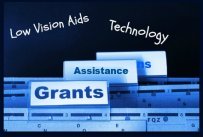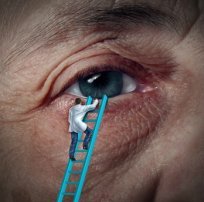Coping With Vision Loss

Do you know someone who has lost their eyesight due to some eye condition that cannot be treated? Wish you could help them in their time of need but don’t know how to do that? Well, then this post is a must-read for you so that you can help individuals struggling with vision loss and guide them through this tough time.
Coping with vision loss is not easy. The idea of losing eyesight or becoming blind can be earth shattering and heart breaking. It does not only impact the life of the sufferer physically, as they find it utterly difficult to perform day to day activities, but at the same time it can lead to an emotional meltdown.
In times like these, how you can help your friend, loved one or a family member with low vision or blindness is to teach them ways to cope with the condition like a true champ.
Get to Know About Vision Loss in Detail
First things first, the person suffering from vision loss should try to dig in deep by learning what they are going through and dealing with. For this patients can order written or taped material on loss of vision through non-profit organizations or state agencies.
However, if the patient needs a comprehensive understanding of the subject in focus, then it is advisable to discuss it with the doctor or other people who are struggling with the same problem.
Here it is important to understand that some conditions like corneal diseases and diabetic retinopathy are treatable while some eye conditions are not. So, the patient needs to learn about the eye condition that led to blindness in their case.
Learn The Role Of Your Optometrist
Seek Therapeutic Counseling for Vision Loss
Another way to cope with vision loss is to seek therapeutic counseling. This is advisable because just like another major life event, blindness can also impact the patient’s life miserably leading to feeling of sadness, loneliness, hopelessness, depression and anxiety. Some people can also have visual hallucinations also known as Charles Bonnet Syndrome.
Charles Bonnet Syndrome is a common condition among those who have lost their vision condition, due to age-related macular degeneration, cataract, glaucoma or diabetic eye disease. Many of these conditions are more common in older people. As a lot of vision is lost, the patient begins to see things that are not really there.
In times like these, it is important seek help through counseling or from a general practitioner.
State agencies, doctors and even non-profit organizations offer counseling services to people with vision loss.
Take Adjustment Classes & Explore Devices for Vision Loss
As daily routine tasks like dressing up and cooking meals can become extremely difficult for those with vision loss, adjustment classes may truly help here. In adjustment classes, individuals can learn alternative techniques and new ways to maintain independence. These classes can help individuals with loss of vision to build motor and mobility skills; and teach patience, coordination and confidence—all much needed to cope successfully with vision loss.
Find Solutions That Work For You
Self-Advocacy Skills
One of the many factors of loss of vision is also age. For seniors with vision loss it is important o learn self-advocacy skills to function in a productive and healthy manner. To learn this, first what seniors need to do is establish a mindset that it is perfectly normal to ask for what you need like assistance with tasks such as transportation as they can no longer drive.
Here effective combination plays a vital role. Effective communication combines a set of skills like ability to understand emotions and listening skills. The person with no or low vision needs to rely on cues like tone of voice to listen effectively as that individual cannot see facial expression, gestures and body language. So, learning the art to understand the tone of voice and rate of breathing of the person that the individual with vision loss is interacting with are crucial to effectively communicate with them and make sure that the tasks that they want them to do for them are done smoothly and the right way without any confusion.
Some organizations are working with full dedication to provide patients suffering from vision loss quality assistance and support. These include our eye health information team. Contact us via our Helpline on 0303 123 9999. Or contact Esme’s Umbrella. Esme's Umbrella is a campaign group working to build up a greater awareness of CBS. You can contact them via call on 0345 051 3925 or email at [email protected].

















